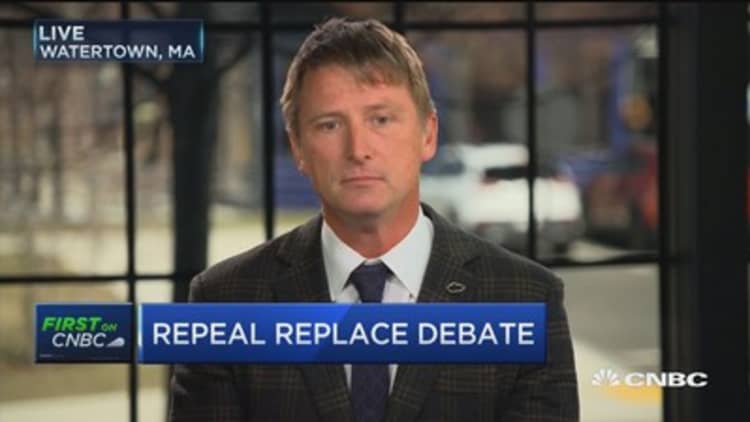
The new health-care plan put forth by House Republicans, the American Health Care Act, isn't so different from Obamacare, which it sets out to replace, Athenahealth CEO Jonathan Bush said Thursday.
"It's a tiny little trim," Bush, nephew of former President George H.W. Bush, told CNBC. "It's 'stick an H in the ACA.' You know, create a little more room for the market, a little less [of a] guaranteed safety net, a little less role of the feds in every dollar. What's the difference, really?"
In a wide-ranging interview on "Squawk Alley," Bush argued that much of the GOP's plan runs close to the Affordable Care Act.
"Generally, you still had employer-based health coverage for most people. You still had Medicare and Medicaid for most of the rest. And then you're talking about what are going to do with this little tiny pile?" Bush said of the new plan.
"One thing that remains in the Obamacare-to-AHCA transition that is important is straight Medicare payment to doctors is carefully designed to kind of shrink," he added, explaining that the move forces doctors to pursue plans other than Medicare that are more expensive, but offer better life expectancy and patient satisfaction.
Bush said it was "good news that everyone's quietly ducking that piece" that remained in the AHCA because it encourages health-care providers to make their services more market friendly.
But as congressional Republicans push for a plan that aims to open up health-care markets, they will inevitably encounter both budgetary and political hurdles, Bush said.
"I think the net-net is they're trying to figure out how to pull back on the 'minimum required benefit' design so that the ... inevitability of price increases doesn't sort of go off into the future," Bush said.
"That's hard for the [Congressional Budget Office] to calculate because how does the CBO calculate the emergence of market forces in a place where there haven't been any for years?" he asked.
Bush added that health providers will not want the government to cut the subsidies their patients receive and will "lobby like hell" to prevent them from getting pulled.
"This is the birth of social science, right? The patron-client interdependency problem," Bush said. "Once you create a group of people that are in receipt of a government dollar, it's very hard to come in and vote that out."
"This is why I think ... the Republicans were so panicked about Obamacare," he said. "Can the Republicans actually roll a bunch of people out of government entitlement only three or four years after they were rolled onto it?"
Still, Bush acknowledged that the GOP plan has favorable aspects. For one, it pushes for price reductions on health services provided to consumers, a challenge Bush argued the ACA didn't tackle, despite its name.
"That's called a market. You've seen them before. They tend to work. And so I like that aspect of AHCA, because [it's] the first time I've heard discussion of actual cost as part of affordability, as opposed to who gets subsidized for what by the government."
"The ability to get a wider range of products at the low end of the product marketing continuum is definitely going to favorably affect cost for everyone," Bush said.


